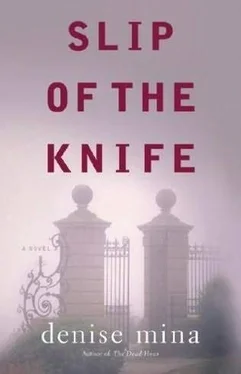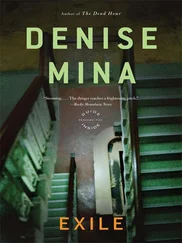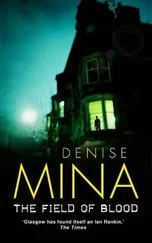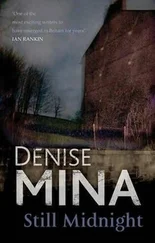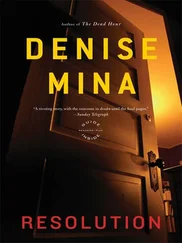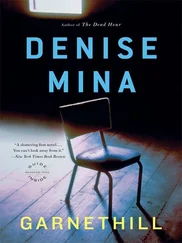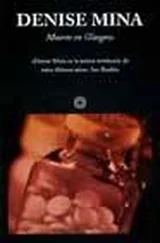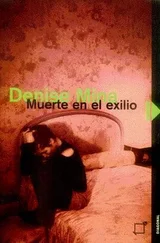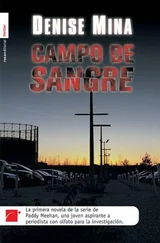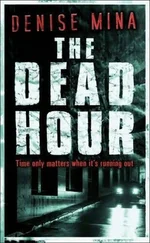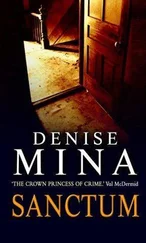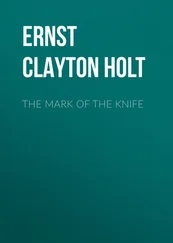She sat up straight. Stranraer.
Meehan had no alibi for the night of Rachel Ross’s murder. He was casing a tax office in Stranraer, where the ferry terminal to Ireland was. Any IRA man in Scotland would be familiar with this road, with the small side roads, where the heavy traffic ran and where was quiet. This was exactly where they would dump a body if they wanted to.
The possibility startled her. There were so many exiles from the Troubles here, mostly Loyalists but a lot of IRA sympathizers among the Scots Irish. Arms were rumored to be shipped through Glasgow. If the IRA had killed Terry, if the conflict had moved here and Scotland wasn’t neutral anymore, it would be a bloodbath. And if any journalist of her generation was likely to have discovered the new development it would be Terry Hewitt. His work had that kind of scope.
A single bed back in the early eighties, dirty orange sheets and a blood spot on her knickers, Terry’s unpracticed hands moving over her body, her own tightness, taking deep breaths, waiting for it to be over.
When he left for South America she helped him take his bags to the London train, smiled and waved from the platform, crying all the way home on the bus. He left her behind to tend her mother and father, to work her way up slowly at the Daily News , the calls-car shift, the Women’s Page or “Dab Sheet,” to struggle with her book about Patrick Meehan. When she sat in her parents’ damp garage pretending to work on the Meehan book, she was secretly rereading his articles about Angola and Central America. She saw him crouched in jungles, sweating under slow fans in tropical hotels, meeting African dictators. When Shadow of Death was finally published, she got an address for Terry from his news agency and sent him an invite to the launch. He didn’t reply.
In her memory he became slim, tanned and tall, the epitome of a dignified search for truth-until he came back.
She wound the window down and threw the burnt-out fag stub onto the tarmac, not deliberately tormenting the gull bully, but glad when it pecked at the oily butt and spat it out.
“Fucker.” She lit another cigarette and watched the gull consider its next move. “Fat, greedy fucking fucker. Arsehole.”
The Bru was still cold.
Terry didn’t drink Bru anymore when he got home. Couldn’t get it abroad, he said. Lost the taste for it. He preferred Coke. He laughed when she bought him a Tunnock’s tea cake from the canteen.
“I remembered them as bigger,” he said pointedly.
That was unnecessary. Mean of him. She missed that clue. She should never, ever have gone back out with him.
She nodded at the gull. “I shouldn’t have gone to Fort William,” she told it. The fat scavenger blinked back at her.
It was five in the morning but, looking up from the car park, Paddy could see that the Daily News building was readying for the day. The long, black glass-and-chrome office building housed a print works downstairs with a glass wall looking into it. A stream of papers flew along the conveyor, print drying, the machine-gun clack-clack of the presses loud in the quiet of the morning. Van drivers gathered by the loading bay, waiting for the bales. Upstairs, on the second floor, the newsroom lights were off at the right-hand side of the room. The Doze Zone. When she worked the night shift they’d kept one part of the big room dark for those who wanted to sleep. Now the staff had been cut so much they only needed to use half the room.
The perpetual decline in Daily News sales meant a high turnover of senior editors, each of whom arrived in the job promising to reverse a global market trend and give the proprietors a better return. The easiest way to cut costs was by reducing wages. Paddy had left the News for a year. By the time she was poached back from the Herald a third of the staff were missing. To be fair, in the glory days of the sixties and seventies the staffing was breathtakingly flabby. Demarcation meant that a driver couldn’t load a van and a journalist wasn’t allowed to empty a bin. Ancillary jobs were so well paid that they were jealously passed from father to son.
When she started as a copyboy, defying the editors and skiving were considered art forms. Now everyone kept their heads down, aware that they were lucky to have survived each incoming editor’s cull, glad to be working in a shrinking market.
Checking her reflection in the rearview mirror, Paddy saw a face puffy from crying. She could pass it off as tiredness.
“I’ve just been woken up,” she told herself. “I was fast asleep and I’ve just woken up.”
She shivered, still too vulnerable to go in without her work face, without her armor. In another time she had been so inconsequential she could have hanged herself at her desk without exciting comment, but those days were long past. She was a name now, drew a big wage and was female.
Her column had started as part of the Herald Dab Sheet, given to her by a sympathetic editor when Pete had double pneumonia. She was glad of it at the time. A column meant she didn’t have to leave the hospital ward and could call her copy in from the pay phone in the lobby. Her opinions on outside matters were exactly what could have been expected from a mother watching her son struggle to breathe every day. Terror made her angry, ill-considered and blunt. She was so controversial they gave her the whole of page five, a banner byline of her name and a front-page name check. The News poached her back to upset their readers.
The column was herself on a bad-tempered rant. She had denounced a perfectly sincere actor who spoke at a political rally in support of a cause he knew nothing about. She once did a whole column about footballers’ taste in casual clothes (“Pigs in Knickers”). She was sometimes embarrassed by the stuff she wrote, like a temper hangover, but the column attracted support from all quarters. She had stumbled on a talent for articulating nationwide annoyances. Her embarrassment was soothed by an exponential rise in her wages and the opportunities it opened up for her. It led to local, then national, radio and on to TV appearances. She did a three-month stint on a Sunday morning TV magazine show, where the lighting made her look extra-fat and mad. People set their alarm clocks to watch it.
She’d wanted to call the column “Land of Sophistry and Mist,” after Byron’s observations on the nastiness of the Scots, but the Herald editor at the time (from Bristol-lasted five months) said it was pretentious, smacked of a knowledge of literature, and cut it to “Land of Mist” without consulting her. “Giving it Misty,” to those in the know, meant ignorant tub-thumping.
Fear had been her inspiration but Pete soon recovered. He was prone to chest infections, but no worse than other kids. Although she was now calm and content, once a week she had to dip back into that black lake. The level was getting lower and lower, so she stole: she sought out angry people, milked them for comment, starting fights in the Press Bar to get an angle on any current issue.
She was successful and knew how that would make colleagues talk about her. They speculated unkindly about her sexual behavior, her income, her home life.
Lauded for her bad-tempered ranting, she feared that she would wake up one morning and find she had morphed into Misty, that she would buy into her public image and actually start to think like that. She had seen it happen to columnists before.
She looked back at the building. Terry Hewitt had stood outside that door waiting for her once, a hundred years ago, his left foot resting on the wall behind him. He had looked up as she came towards him, a warm smile on his face. He had worn a leather jacket; she was impressed by that.
Читать дальше
